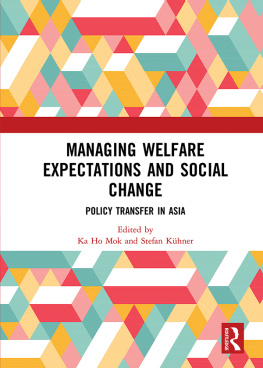
The International Library of Sociology
SOCIAL SERVICES
IN BRITISH INDUSTRY
Founded by KARL MANNHEIM
The International Library of Sociology
PUBLIC POLICY, WELFARE AND SOCIAL WORK
In 18 Volumes
| I | The Church in Social Work | Hall and Howes |
| II | Creative Demobilisation (Part One) | Gutkind |
| III | Creative Demobilisation (Part Two) | Gutkind |
| IV | Higher Civil Servants in Britain | Kelsall |
| V | Housing Needs and Planning Policy | Cullingworth |
| VI | Penelope Hall's Social Services of England and Wales | Forder |
| (The above title is not available through Routledge in North America) |
| VII | The Price of Social Security | Williams |
| VIII | The Professional Task in Welfare Practice | Nokes |
| IX | Social Casework | Timms |
| X | Social Policies for Old Age | Shenfield |
| XI | Social Security: Beveridge and After | George |
| XII | Social Services in British Industry | Young |
| XIII | Social Services of Modern England | Hall |
| XIV | The Sociology of Housing | Morris and Mogey |
| XV | Voluntary Social Services since 1918 | Mess |
| XVI | Voluntary Societies and Social Policy | Rooff |
| XVII | Voluntary Work and the Welfare State | Morris |
| XVIII | Working with Community Groups | Goetschius |
SOCIAL SERVICES IN
BRITISH INDUSTRY
by
A. F. YOUNG
First published in 1968 by
Routledge
Reprinted 1998, 2000,2001 (twice), 2002
by Routledge
2 Park Square, Milton Park, Abingdon, Oxon, OX14 4RN
Transferred to Digital Printing 2007
Routledge is an imprint of the Taylor & Francis Group
1968 A. E Young
All rights reserved. No part of this book may be reprinted or reproduced or utilized in any form or by any electronic, mechanical, or other means, now known or hereafter invented, including photocopying and recording, or in any information storage or retrieval system, without permission in writing from the publishers.
The publishers have made every effort to contact authors/copyright holders of the works reprinted in The International Library of Sociology. This has not been possible in every case, however, and we would welcome correspondence from those individuals/companies we have been unable to trace.
British Library Cataloguing in Publication Data
A CIP catalogue record for this book is available from the British Library
Social Services in British Industry
ISBN 0-415-17724-3
Public Policy, Welfare and Social Work: 18 Volumes
ISBN 0-415-17831-2
The International Library of Sociology: 274 Volumes
ISBN 0-415-17838-X
Publisher's Note
The publisher has gone to great lengths to ensure the quality of this reprint but points out that some imperfections in the original may be apparent
Contents
Analysis of the fundamental concepts. Comparison with
Trade Unions
The material for this book has been acquired through a lifetime of study and discussion, and it would be impossible to name all to whom I am indebted. But my thanks are given to the many trade union officials, social workers, colleagues and those not officially associated with industry or the social services who have provided me with much valuable information.
Though the responsibility for what has been written is essentially mine, the knowledge and experience of what happens in practice, and the thinking which has moulded the way in which it has been presented, are the result of what so many others have contributed. Where the actual compiling of the text is concerned, I am particularly grateful to Mr A. V. Ahier for his comments on Part I, and to Messrs W. H. Marwick and A. J. Rees for reading the typescript and for their valuable suggestions. I am indebted to Miss D. Marshallsay, as always, for her expert help in compiling the bibliography and index, to Mrs I. Bason and her staff for their willing and cheerful assistance in the typing of the manuscript, and finally to Miss O. Simpson for her most valuable help in correcting the proofs.
The title Social Services in British Industry might seem a contradiction in terms. Industry is concerned with productive processes and the provision and exchange of goods and services which mankind has developed to meet his economic needs. The social services are mostly provided where the individual has been unable, for one reason or another, to realise his full potential, or even achieve sufficient development to make a reasonable life possible. We think of industry in terms of organisationinvolving capital, labour, raw materials and finished products. The social services, on the other hand, are thought of in terms of poverty, ill-health, degradation and squalor. Thus the concepts would appear poles apart different worlds.
Experience has shown how closely connected these worlds are. Most people in a modern urban community rely on industry for the means by which their pattern of life is made possible. In this process they may have become ill, been maimed, dismissed, poorly paid, subjected to pressures that have rendered decent living impossible. In short, they have been put at risk in a variety of ways that no other experience could parallel.
Looked at in another way, industry, in the broadest sense, is the life-blood of a nation, on which all depend, not only for their present livelihood, but their future hopes of betterment. It would be an invalid argument if one were to claim that humanity is at all times more important than productivity. Dignity and happiness are of little moment if the over-riding need is to produce. (Experience during the wars proved this.) But in the long run the human factor must be considered, both because in essence industry depends on it, and must therefore have a force of well-trained workers who feel responsible for its success, and because industry has come to appreciate that workers are not merely living organisms with hands to produce, but people with needs and aspirations.
So social services have had their part to play in industry, as they have in the community at large. But what is a social service? Definitions have probably three functions. They indicate what the words mean, they try to say something valuable about the concept itself, and above all, they are a means of communicating to others an understanding of what is being discussed. As with most important ideas and institutions, no short, snappy phrase could in any way describe what social services are, and no two writers would agree on a form of words to encompass them. Moreover, the general concept of social services, as they apply to poverty, crime, sickness or disablement, seems curiously inappropriate in the realm of industry.
What is being attempted here is a consideration of services which are associated with working people (including staff and manual workers) and intended to deal specifically with the problems found in industry. They are not exclusively focused on industry. For example, disablement services are frequently available to those who are not gainfully employed as well as to those who are.










